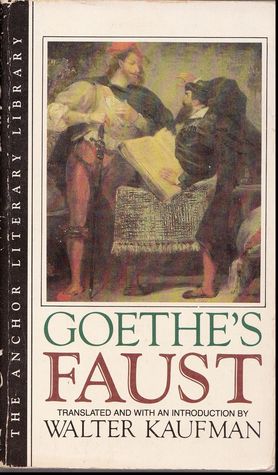Teresa's Reviews > Goethe's Faust
Goethe's Faust
by

by

I'm glad I read this if only because my preconceptions of this work have been shattered. It's not loaded with philosophy, in fact there are hardly any abstruse passages. It's got a modern feel; according to Kaufmann's introduction, earlier (Victorian) translations are what made it seem not: I pictured Brecht puppets in many of the scenes. It's funny; humor runs almost throughout especially in the speech of Mephisto, who, of course, is more entertaining than Faust. The language can be colloquial and even a bit bawdy. The end of the first part is particularly lyrical and it certainly owes quite a bit to the madness of Shakespeare's Ophelia.
I don't know German, but I liked being able to glance over to the opposite page to see what the original looked like when a translated word or phrase caught my fancy. This edition, for the inclusion of the original text and the impressive translation (at least it was to me), probably deserves 5 stars.
I don't know German, but I liked being able to glance over to the opposite page to see what the original looked like when a translated word or phrase caught my fancy. This edition, for the inclusion of the original text and the impressive translation (at least it was to me), probably deserves 5 stars.
Sign into Goodreads to see if any of your friends have read
Goethe's Faust.
Sign In »
Reading Progress
January 22, 2014
– Shelved
January 22, 2014
–
50.7%
"Mephisto:
... Fill it, sybil, pour;/
My friend is safe from any injuries:/
He has a number of degrees
And has had many drinks before."
page
255
... Fill it, sybil, pour;/
My friend is safe from any injuries:/
He has a number of degrees
And has had many drinks before."
January 26, 2014
–
80.12%
"Mephisto:
... Are you reaching for thunder? Well that it was not given to you wretched mortals! Shattering those who answer innocently, is the tyrant's way of easing his embarrassment."
page
403
... Are you reaching for thunder? Well that it was not given to you wretched mortals! Shattering those who answer innocently, is the tyrant's way of easing his embarrassment."
Started Reading
January 28, 2014
–
Finished Reading
Comments Showing 1-10 of 10 (10 new)
date newest »
newest »
 newest »
newest »
message 1:
by
Kalliope
(new)
-
added it
Jan 29, 2014 01:03PM
 Funny, because reading Mann's Doctor Faustus, one of the chapters also made me think of puppets.
Funny, because reading Mann's Doctor Faustus, one of the chapters also made me think of puppets.
reply
|
flag
 Teresa wrote: "Interesting. Here it's because there are talking monkeys and all kinds of crazy goings-on."
Teresa wrote: "Interesting. Here it's because there are talking monkeys and all kinds of crazy goings-on."In Mann's case it is because the characters are mouthpieces for ways of conceiving the world. The best is Deutschling (!) who praises "Germanness" and thinks that "Youth" is a German state of being (published in 1947).
 I read in the intro that Goethe's Faust was seen as a German "state of being", though Goethe said that's not what he was going for. (I'm paraphrasing.)
I read in the intro that Goethe's Faust was seen as a German "state of being", though Goethe said that's not what he was going for. (I'm paraphrasing.)
 Teresa wrote: "I read in the intro that Goethe's Faust was seen as a German "state of being", though Goethe said that's not what he was going for. (I'm paraphrasing.)"
Teresa wrote: "I read in the intro that Goethe's Faust was seen as a German "state of being", though Goethe said that's not what he was going for. (I'm paraphrasing.)"Interesting. I have read Marlowe's and ideally I should have read Goethe's before Mann, but did not have the time... Eventually...
 I think I've read all of Marlowe's version, certainly parts of it. Perhaps what struck me most about Goethe's version is how little, if any, moralizing there is. He himself said it was entertainment and laughed at those who tried to find meaning in it.
I think I've read all of Marlowe's version, certainly parts of it. Perhaps what struck me most about Goethe's version is how little, if any, moralizing there is. He himself said it was entertainment and laughed at those who tried to find meaning in it.
 I probably should reread it as well. But this version sounds like a good alternative for the original. I won't attempt it in German though. lol.
I probably should reread it as well. But this version sounds like a good alternative for the original. I won't attempt it in German though. lol.
 I read the A.S. Klein edition and it did remind me of Don Quixote where Part 2 was much more campy than part one. Part I almost had a Dickens feel with Gretchen’s story.
I read the A.S. Klein edition and it did remind me of Don Quixote where Part 2 was much more campy than part one. Part I almost had a Dickens feel with Gretchen’s story.



